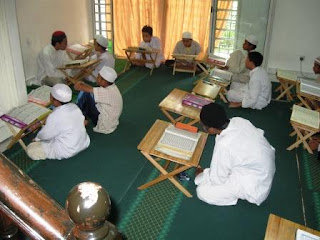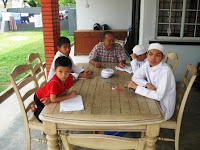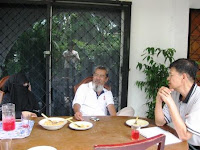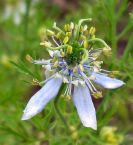
Last Saturday, 5th September 2009, my family and I went to IKEA at Mutiara Damansara to buy some household goods for our newly-completed house in Dungun, Trengganu. Well, it's going to be exciting to celebrate the Aidil Fitri's festival at a new house, right? Just like it's exciting to get a new car before the festival.
We arrived at IKEA rather early, around 11.30am, and easily found a place to park our car.
Whilst in the "shopping" mood, we totally forgot that the time for the zohor prayer had arrived. When I looked at the time on my mobile phone, it was already 2.30pm. I said to myself "Astaghfirullahalazim....." (God forgives me). We had been careless or negligent by the shopping spree that we didn't realise that the prayer time for zohor had passed us. After that I hurriedly brought my family to the prayer room, which was fortunately available at IKEA, to perform the zohor prayer.
In the fasting month of Ramadhan, as we approach closer to the 1st day of the Syawal month (Aidil Fitri), it's very typical of Malaysian Muslims to go for shopping for new clothings, handbags, shoes, festival cakes and the likes. I hope that the shopping does not make us careless of the prayer times like what happened to me at IKEA, where I was careless of the time to perform the zohor prayer.
It was related by Abu Huraira r.a. that the Messenger of God (PBUH) said:
"The place that God loves most is the mosque. The place that God hates most is the market.""Market" includes supermarket, shopping complex and shops. One of the reasons that God hates these places is because we tend to forget our duties to HIM when it comes to performing the fardhu (obligatory)prayer when the time is due.
It is advised that during shopping time, if we hear the "azan" or are "reminded" by God that the time for prayer is due, we should immediately stop shopping or whatever we are doing and look for the nearest place to perform our prayer.
Let's not delay in performing our prayer by saying things like, " Oh..there is still ample time to perform the prayer..." because delay in performing our prayer without a valid reason will bring disaster to ourselves, as narrated in the following hadith by Imam Ahmad and Baihaqi:-
At one time, Muaz bin Jabal r.a. approached the Messenger of God (PBUH) and asked him, "Oh Messenger of God, please explain to me regarding the content of the Al-Quran, which says that :-
"The day that the Trumpet shall be sounded, and ye shall come forth in groups." (An-Naba' : 18)
When he heard the question, the Messenger of God (PBUH) cried until his clothes were wet with his tears.
He (PBUH) then answered, "Oh Muaz, you have asked me a very significant question, whereas on that day my followers would be brought into 12 groups. Each group with its own features."
The hadith then describes the features of each of the 12 groups, but I'm not going to state here all the 12 different features, except the feature of the group which is relevant to this case, which is :-
"The people in the group that like to carelessly delay in responding to the call for performing their prayer shall
look like a pig."
There is definitely no hadith or Quranic verse that says that we should go shopping in the month of Ramadhan to celebrate the Aidil Fitri. In fact, in the month of Ramadhan, especially towards the last 10 days, we should be spending most of our time doing good deeds to increase our "investment" in the life hereafter.We should also look forward to the "Lailatul-Qadar" night, which according to the Al-Quran,
"is a night better than a 1000 months." (Al-Qadr : 3)
New clothings and other purchases can be done at other times, not necessarily in the month of Ramadhan. Any excess money is better spent on those in needs, like the poor people, orphans and mosques so that we are blessed and rewarded 10 to 700 times if compared to the reward at other months for the same deeds.
Lastly, do not forget to pay the tithe bcause those who do not pay the tithe are described in one of the 12 groups as "the person whose stomach is as large as the mountain and filled with snakes and scorpions."
-----------------------------------------
Bahasa Malaysia Version:-Pada hari Sabtu 5hb September 09 yang lepas, saya seisi keluarga telah pergi ke IKEA di Mutiara Damansara untuk membeli barang-barang perkakas rumah bagi rumah kami yang baru siap dibina di Dungun, Trengganu. Maklumlah, seronok nak berhari raya di rumah baru. Seperti juga seronoknya apabila dapat membeli kereta baru sebelum Hari Raya.
Kami tiba di IKEA agak awal sedikit dalam pukul 11.30 pagi dan dengan senang kami mendapat tempat untuk meletak kereta.
"Shopping punya shopping", kami telah terlupa apabila sudah tiba waktu zohor. Apabila saya melihat jam di telefon bimbit saya yang menunjukkan sudah pukul 2.30 petang, saya mengucapkan, "Astaghfirullah.....". Rupa-rupanya saya telah dilalaikan oleh "shopping" saya sehingga tidak sedar sudah masuk waktu zohor. Lepas itu saya terus mengajak keluarga saya untuk pergi ke surau yang nasib baik ada disediakan oleh IKEA di bangunan itu, untuk mengerjakan solat zohor.
Di musim bulan Ramadhan dan semakin dekat tibanya Hari Raya Puasa, memang menjadi lumrah kaum Muslimin dan Muslimat di Malaysia untuk "shopping" pakaian baru, "handbag" baru, kasut baru, kueh-mueh dan seumpamanya. Saya harap semasa "shopping" itu, kita tidak dilalaikan seperti apa yang berlaku kepada saya di IKEA sehingga lambat untuk mengerjakan solat fardhu zohor.
Daripada Abu Hurairah r.a., Nabi s.a.w. bersabda,
"Tempat yang paling disukai Allah ialah masjid. Tempat yang paling dibenci Allah ialah pasar." (Riwayat Muslim)
"Pasar" termasuk juga pasaraya, "shopping complex" dan kedai-kedai. Satu daripada sebab-sebab mengapa Allah SWT membenci tempat-tempat yang sebegini adalah kerana tempat-tempat ini mudah melalaikan kita daripada menunaikan tanggung-jawab kita untuk mengerjakan solat fardhu setelah tiba waktunya.
Semasa "shopping" itu, sekiranya kita mendengar azan berkumandang atau di"ingatkan" oleh Allah SWT bahawa sudah masuk waktu solat, hendaklah kita hentikan "shopping" kita itu atau meninggalkan apa yang sedang kita buat dan terus mencari tempat yang terdekat sekali untuk mengerjakan solat.
Jangan kita melengah-lengahkan tanggungjawab kita itu dengan memberi alasan-alasan seperti, "Aah...tak mengapalah, ada banyak masa lagi...." kerana berlengah-lengah dalam mengerjakan solat fardhu tanpa sebab yang munasabah adalah menganiayai diri kita sendiri, seperti hadith yang di riwayatkan oleh Imam Ahmad dan Baihaqi, iaitu:
Suatu ketika, Muaz bin Jabal r.a. menghadap Rasullullah s.a.w. dan bertanya, "Wahai Rasullullah, tolong huraikan kepadaku mengenai firman Allah(Iaitu)
pada hari ditiup sangkakala (trompet), lalu kamu datang berbondong-bondong." (An-Naba' : 18)
Mendengarkan pertanyaan itu, baginda s.a.w. menangis sehingga basah pakaiannya dengan air matanya.
Lalu baginda s.a.w. menjawab, " Wahai Muaz, engkau telah bertanyakan kepadaku perkara yang amat besar, bahawa umatku akan dibawa, dikumpulkan berbaris-baris menjadi 12 barisan. Masing-masing dengan pembawaan sendiri."
Lepas itu hadith itu menghuraikan satu-persatu pembawaan dalam 12 barisan itu, tetapi saya tidak mahu menyebutkan di sini kesemua 12 pembawaan yang berbeza-beza itu, kecuali yang ada kena mengena dengan melengah-lengahkan solat, iaitu:
"Golongan yang suka melengah-lengahkan solat adalah mereka yang menyerupai babi."Jadi, sekiranya kita termasuk golongan yang suka melengah-lengahkan solat kita di dunia ini, janganlah terperanjat di hari akhirat kelak apabila kita dimasukkan ke dalam barisan di mana rupa-rupa kita menyerupai babi. Wallahu'alam...
 If you are a Muslim and wish to buy a "halal" soap at a big supermarket like Tesco, Giant or Carrefour, chances are that you won't find it or would have some difficulties locating it. This is because most soap brands contain glycerine, which is chemically derived from animal fats.
If you are a Muslim and wish to buy a "halal" soap at a big supermarket like Tesco, Giant or Carrefour, chances are that you won't find it or would have some difficulties locating it. This is because most soap brands contain glycerine, which is chemically derived from animal fats.



























